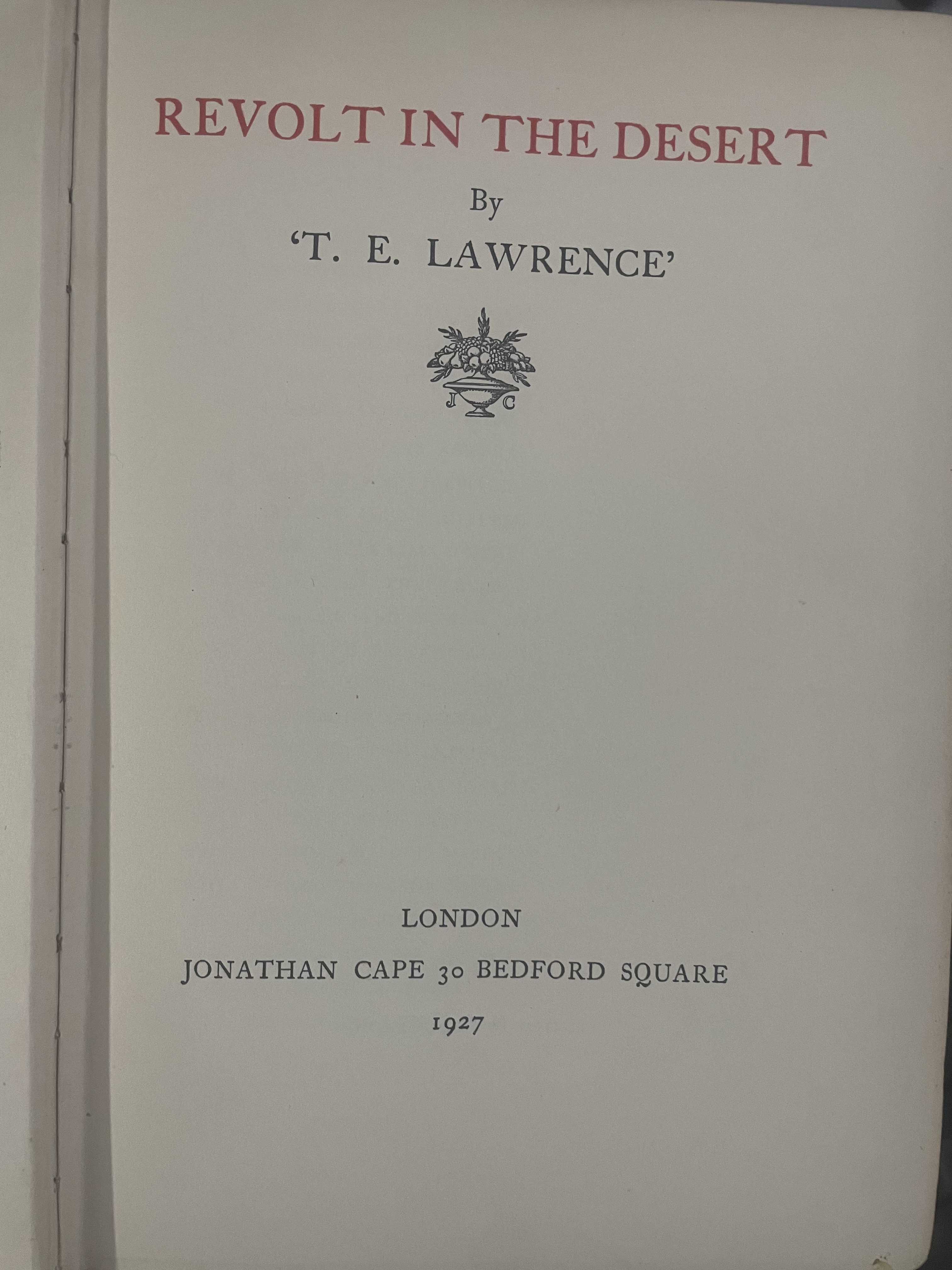Revolt in the Desert

About
Summary
Exquisite
TOC
Details
Related
URL
Images
Overview
Revolt in the Desert by T.E. Lawrence, published in 1927, is an abridged version of his much longer and more complex work, Seven Pillars of Wisdom. It recounts Lawrence's experiences and perspective on the Arab Revolt against the Ottoman Empire during World War I. The book provides a gripping first-hand account of the events, offering insights into Lawrence's role, the dynamics of the revolt, and the cultural landscape of the Middle East.
Importance of Book
A Gripping First-Hand Account: The book provides a compelling and dramatic first-hand account of the Arab Revolt, offering readers a glimpse into the challenges, sacrifices, and triumphs of the campaign.
Insights into T.E. Lawrence's Character and Leadership: It offers insights into Lawrence's complex personality, his motivations, and his exceptional leadership skills. Lawrence is portrayed as an irreverent and honest man who is aware of his great impact in the region.
Understanding the Arab Revolt: The book provides valuable information about the Arab Revolt, its causes, its key players, and its significance in the context of World War I and the broader history of the Middle East.
Influence on Public Perceptions of the Middle East: Lawrence's writings have significantly shaped Western perceptions of the Middle East and its people, influencing popular culture and academic discourse.
An Accessible Account: Compared to Seven Pillars of Wisdom, Revolt in the Desert is shorter and written for a wider audience, making it more accessible to general readers.
Key Themes
The Complexities of War: The book portrays the complexities of war, highlighting the physical and psychological toll it takes on soldiers and civilians alike.
Cultural Encounters and Understanding: It explores the challenges and rewards of cross-cultural encounters, emphasizing the importance of understanding and respecting different customs and traditions.
Leadership and Influence: The book examines the nature of leadership, demonstrating how individuals can inspire and mobilize others through a combination of charisma, strategic vision, and cultural understanding.
Imperialism and its Consequences: As suggested by scholarly analysis, the book also raises questions about imperialism and its consequences, prompting readers to consider the ethical implications of Western involvement in the Middle East.
The importance of seeing the world in new ways: For Hynes, Lawrence's writing embodied one of the key conflicts within the experience of the Great War that would go on to play a seminal role in the shaping of the modernist imagination; the desire for a counter to the deracination produced by the organization of industrial society in the modern West and the imperatives of realpolitik.
Cultural Significance
Shaping Western Perceptions of the Middle East: Lawrence's writings have played a major role in shaping Western perceptions of the Middle East, its people, and its history.
Inspiration for Literature and Film: The book has inspired numerous works of literature and film, most notably the film Lawrence of Arabia, which further cemented Lawrence's image as a romantic hero.
Influence on Military Strategy: Lawrence's tactics and strategies during the Arab Revolt have been studied by military theorists and practitioners, influencing approaches to unconventional warfare.
Source of Debate and Controversy: Lawrence's legacy remains a subject of debate and controversy, with some critics questioning his motives, his accuracy, and the impact of his actions on the Middle East.
Effects on Society
Informing Public Opinion about the Middle East: The book likely helped to inform public opinion about the Middle East, shaping perceptions of the region and its people.
Promoting Interest in Middle Eastern Culture: It may have stimulated interest in Middle Eastern culture, encouraging readers to learn more about the history, language, and customs of the region.
Inspiring Adventure and Exploration: The book's vivid descriptions of the desert landscape and the challenges of the Arab Revolt may have inspired a sense of adventure and exploration in some readers.
Contributing to a Critical Examination of Imperialism: The book has prompted critical re-evaluations of Lawrence's intentions and impact on the Middle East, urging a look at colonial motivations.
Conclusion
Revolt in the Desert by T.E. Lawrence is a gripping first-hand account of the Arab Revolt that offers insights into Lawrence's character, the dynamics of the revolt, and the cultural landscape of the Middle East. The book's importance lies in its accessibility, its influence on Western perceptions of the Middle East, and its contribution to discussions about war, culture, and imperialism. Its key themes include the complexities of war, cultural encounters, leadership, and the legacy of imperialism. Its cultural significance stems from its role in shaping Western understandings of the Middle East and its inspiration for literature and film. The book has had a lasting effect on country and society, informing public opinion, promoting interest in Middle Eastern culture, and contributing to critical examinations of colonialism.
Title
Revolt in the Desert
Author
T E Lawrence
Name of Publisher
Jonathan Cape Bedford Square London
Publish Date
1927
Subject
A compelling account of Lawrence?s experiences during the Arab Revolt against the Ottoman Empire during World War I
Vintage
1901-1947
Number of Pages
445
Category
Biography
Sub Category
Military
Rarity
RARE
